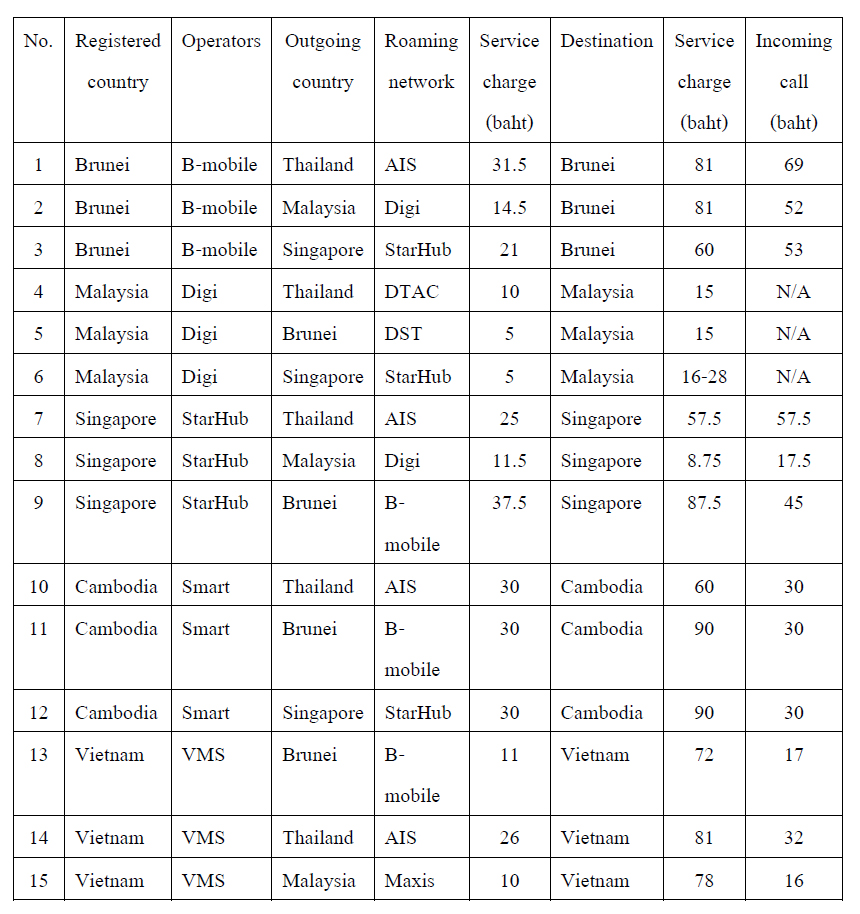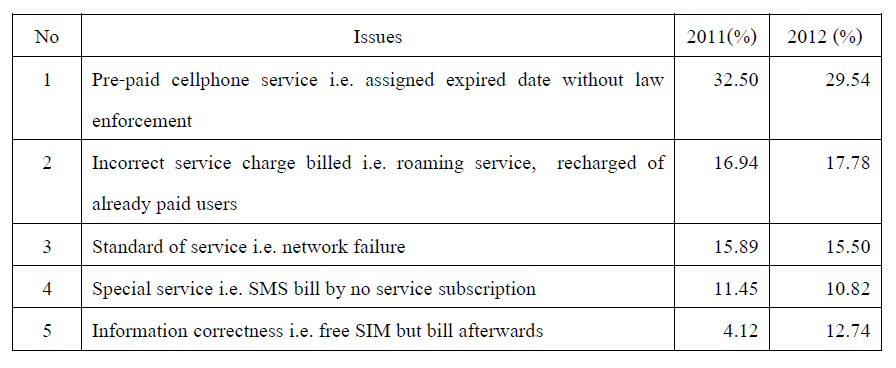|
Research Methodology
The research entitle "Agenda setting on mobile roaming rate control to promote ASEAN integration" is documentary research based on value or normative judgement which review and analyze both of paper and electronic forms including scholarly articles, academic publications, magazines, annual reports from multiple sources. The objective of this are to study whether mobile roaming is recognized as problem or not and to understand why mobile roaming rate control come to be issued, and second to identify what and why should be specific alternative for intra-ASEAN mobile roaming rate control taken into consideration.As Problem window, we observed likelihood indicators that would be affected to setting agenda, then, tried to find out what would be focusing events to raise mobile roaming rate as agenda. Next, we would like to determine there are any feedbacks from various actors to bring problems into consideration and what magnitude of concerning is.As Policy window, we review from statement, article of written by specialists both of inter and intra-ASEAN to find ideas and concepts related mobile roaming control. In addition, we are thoughtful of operators serving as an impetus or a constraint role in this issue. As a politic window, we review ICT government policies from both of Abhisit and Yingluck governments to examine how having been involved on that agenda. The ICT policies from former government until now were reviewed and analyzed to determine how government concentrate on mobile roaming rate control in view of public/ private issues. Next we observed pressure groups campaigns in mobile roaming rate control. Finally, Possible alternatives were indicated to define the reasonable specific alternative on mobile roaming control (Kingdon, 1995: Patcharee, 2013, pp.9-13).
Results of the study and analysis
Roaming was occurred under the concept of "one number connected the world" that allows customer easy to going anywhere. Without considering complicated technical aspects of roaming, All operators try to make a contract to permit their customers using other networks worldwide, for instance, Advance Info Service Public Company Limited (AIS) customers going to Brunei Darussalam their mobile phones will show "BRU-DSTCom/TH GSM". It means that you would have been extra-charged from service operator, for example not including 7% VAT, you will charged 85 baht/min calling to mobile phone using Thailand network roaming in Brunei Darussalam and 55 bath/min calling back to person stay in Thailand; moreover, there is incoming service charge in roaming that receivers have to pay.Dissimilarity, True Corporation Public Company Limited (True Move) costs 12 baht/min calling in Brunei Darussalam and 60 baht/min calling back to Thailand. It realized that it is very expensive roaming rate comparing to other countries, for example from Table 1, DigiCo.,Ltd customers Malaysia going to Singapore by roaming StarHubCo.,Ltd network pay 5 baht/min for service charge, then when calling back to Malaysia it costs 16-28 baht/min depending on destination but definitely cheaper than Thailand network roaming.

Table 1 Intra-ASEAN roaming service for Thailand, Brunei Darussalam, Malaysia, Singapore, Cambodia and Vietnam
Problem window
1. Likelihood indicators
Indicators are tools to monitor whether the condition has become to problem or not. For understanding, condition and problem should be clearly differentiated. Condition is classified as any incidences but it is not come to an attention of policy makers. For example, an occurrence of AIDs in almost 30 years ago with few people affected to that disease is condition because it is not important point in the past. Now, that is considered as an international epidemic disease which no effective treatment so AIDs at this stage is considered as a problem because of increasing attention from its harmful by public or maybe policy makers(Gerston, 2008, p.36).In this study,the most possible indicators affecting to the mobile roaming rate control agenda setting is lower mobile roaming price of other countries. Table 1 shows that mobile phone registered in Malaysia calling to Brunei Darussalam was roaming charged 5 bath/min. In contrast, there will be 85 baht/min if using Thailand registered mobile phone calling to Brunei Darussalam. As a result, there is a big gap in mobile roaming rate even we are members in ASEAN community whose ideology is one vision one identity one community but why mobile roaming is not the same unlike imported tax rate.
2. Focusing events or crisis
Focusing events or crisis is rare event but sudden made public giving an attention like earthquake, Tsunami disaster and so on(Birkland, 2007, p.74).As reviewed in this study, there are no focusing events or crisis to activate mobile roaming control agenda so it is taken into account less likely to influence this agenda setting.
3. Feedback for existing program
Feedback is one of the major channel to bring problems to an attention. As newspapers, mass media, and World Wide Web reviewed, we found that there were talking about the study of lower intra-ASEAN roaming charged in ASEAN ICT Master Plan 2015 which planned to start in 2011. However, it has very slow progression; there is no update on public documents or any governmental sector websites about advancement. However, on customers viewpoint, there are a few feedbacks on social network and web blog. Table 2 shows number of telecommunication complaints in percentage between 2011 and 2012 (NBTC, 2013, p.5).

Table 2 Percentage Comparison on Telecommunication Complaints between 2011 (n=2,184) and 2012 (n=2,265)
Policy window
1. Knowledge of specialists
As globalization, telecommunication knowledge will gradually accumulate thoroughly informative-based mobile roaming rate control. There are studies result in various parts of the world which show that in Arab world, American, Asia-Pacific and Africa have agenda setting to control mobile roaming control with suggested or regulated by international organizations including International Telecommunications Regulations (ITU), Organization for Economic Co-operation and Development (OECD) proposed the recommendation on international mobile roaming services for voice and data roaming, and World Trade Organization (WTO) whose roles to promote more competitive in delivery of roaming service. In ASEAN, Singapore and Malaysia have reached collaborative regulation to reduce roaming price up to 30% for voice calls by all mobile operators ("Bilateral mobile roaming", 2011). In this intervention, Singapore approach is based on industrial policy reflecting its position as ASEAN international business hub but the status of Malaysia was served as supporter in political reasons. In addition, European reason was primarily based on political support to solve the problem in European project. For cell phone roaming rate control, Liau Yun Qing, 2012 said that it is overambitious to create a free mobile roaming zone in Southeast Asian region as supported by StarHub Co.,Ltd in Singapore stated that there is no free roaming elsewhere in the world. However, there is some controversies about this because Telkom Co.,Ltd in Indonesia believes that even taking time but it is possible to create roaming free zone. From this occurrence, It can be analyzed from specialists knowledge that the possible alternative for roaming rate control is reducing approach.
2. Operators
As mentioned earlier, Thailand mobile service operators is oligopoly business so they are more powerful to negotiate to stakeholders even though we have regulator organization like NBTC to control or enforce operators to follow in conform as the rule (National Telecommunication Committee, 2008, p.93). In 2013, It is even though considered as "customer protection year", various evidences show that they do not harmoniously operate in accordance with the statute. There is little impetus for operators to create roaming fee because they do not want to lost profit. Expected to government sectors, It is hopeless because NBTC dealing with mobile roaming issue by making customer suggestionto turn off data update or following documented guideline when going oversea countries to prevent "Bill shocks" effect. NBTC's way is parallel to Federal Communications Commission forcing operators in United State of America to send short messages for customers roaming awareness (Sutherland, 2012, p.14) |


